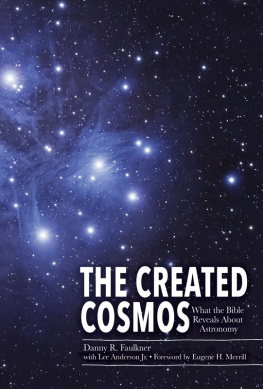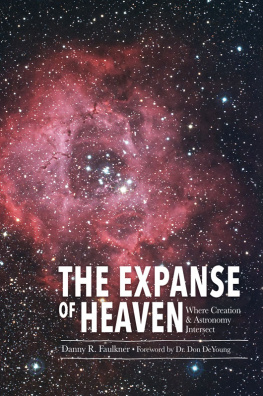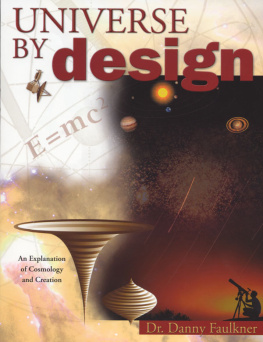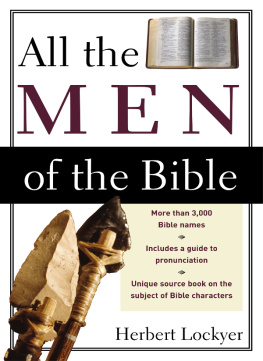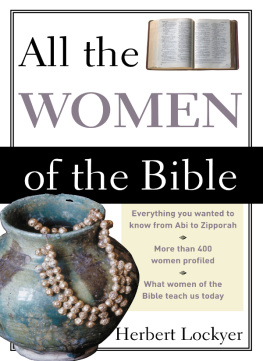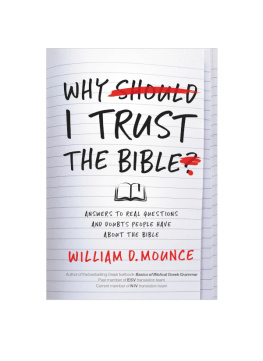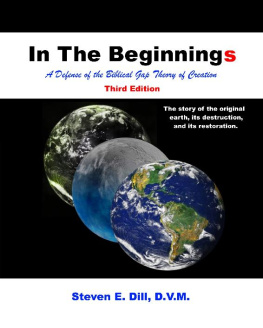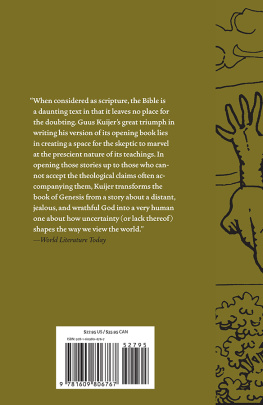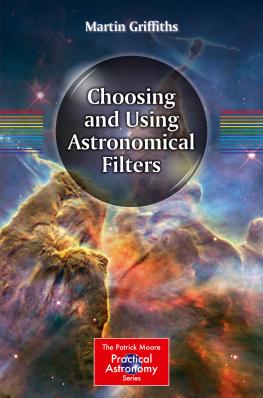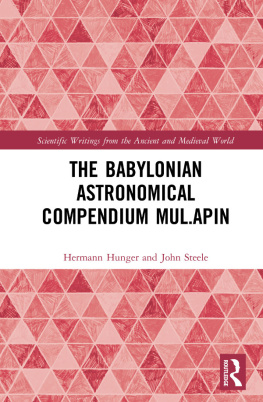First printing: 2016
Second printing: August 2021
Copyright 2016 by Danny R. Faulkner.
Appendix copyright 2015 by Lee Anderson, Jr. Used by permission.
All rights reserved. No portion of this book may be reprinted, stored in a retrieval system, or reproduced without the express written permission of the authors and the publisher, except in the case of brief quotations in articles, reviews, and educational materials. For information write:
Master Books, P.O. Box 726, Green Forest, AR 72638
Master Books is a division of the New Leaf Publishing Group, Inc.
ISBN: 978-0-89051-973-8
ISBN: 978-1-61458-548-0 (digital)
Library of Congress Number: 2016910841
Front cover photograph by Jim Bonser. Used by permission.
Back cover photograph by Danny R. Faulkner.
Scripture quotations, unless otherwise noted, are taken from The Holy Bible, English Standard Version, copyright 2001 by Crossway Bibles, a division of Good News Publishers. Used by permission. All rights reserved.
Scripture quotations so noted are taken from the NEW AMERICAN STANDARD BIBLE, Copyright 1960, 1962, 1963, 1968, 1971, 1972, 1973, 1975, 1977, 1995 by The Lockman Foundation. Used by permission.
Scripture quotations so noted are taken from the New King James Version. Copyright 1982 by Thomas Nelson. Used by permission. All rights reserved.
Please consider requesting that a copy of this volume
be purchased by your local library system.
Printed in the United States of America
Please visit our website for other great titles:
www.masterbooks.com
For information regarding author interviews,
please contact the publicity department at (870) 438-5288
To the late George Mulfinger,
a professor of mine forty years ago.
We shared a passion for creation,
especially as it applied to astronomy.
He was a gentle man and a wonderful role model.
Contents
PART 1: Astronomical Concepts in the Bible:
What Scripture Plainly Teaches about Astronomy
PART 2: Astronomical Anomalies in the Bible:
What Scripture Says about Unusual Astronomical Event
PART 3: Astronomical Questions and the Bible:
How Scripture Confronts Recent Questions about Astronomy
PART 4: Astronomy and Distortions of the Bible:
Misconceptions of What Scripture Teaches about Astronomy
Foreword
One of the plagues in modern times with respect to the Bible-science stand-off is preachers who think they are scientists and Christian scientists who think they are Bible scholars. Not to be included are secular, humanistic scientists who pay no attention to the whole matter in any case, viewing it, as they do, from their Mount Olympus, as another spat of mere mortals who know nothing and have nothing worthwhile to say. Few indeed are the conservative, evangelical voices that can speak in the midst of the melee with authority founded on both credentialed scientific expertise and a degree of linguistic and exegetical skill sufficient to allow the sacred Scriptures also to speak and to do so with persuasive power. Such a work is this.
This writer, with like-minded others of late, has become greatly concerned about the inroads into contemporary evangelical scholarship of the assumption that the writers of the Hebrew texts followed lock-step the Weltanschauung and cultural norms of their respective historical environments, an adaptation by them to social and literary world-views that may be dubbed patternism. This method presupposes a universal commonality of fundamental ideologies, unitary ways of reflecting on, interpreting, and recording the past, resulting, in Israels case, in a certain degree of cultural adaptation and association, alleged literary borrowings and dependencies from secular sources by its scribes and scholars, and the like. Moreover, the pilfering of conceptual notions and the texts that relate them is always thought to be by the biblical writers, never the other way around. Thus, Atra-ass informs the Genesis creation story, Enma eli the biblical Flood narrative, and the Code of Hammurabi the Mosaic Torah.
Defenders of a Bible uniqueness view have found themselves foundering about in a morass of data, debate, and, sadly, defection from the time-honored views of the Fathers who preceded us and laid down for us an infrastructure of faith in the inerrant word that come what may was sufficient for every storm and conflict. One thinks of the Robert Dick Wilson, William Henry Green, Edward J. Young, O. T. Allis, R. Laird Harris, Gleason L. Archer, and others like them in yesteryear, men who stood firm against the tsunamis of liberal historical-criticism despite the risk of losing position, reputation, and academic renown in the eyes of those of lesser acumen and scholarship, counting it a small price to pay for truth and integrity.
In their wake have come evangelicals who, often well-trained and bright, could easily have taken up the mantle of the fallen warriors but have elected instead to belong to the academy where everyone knows and admires one another and where there is the ease and comfort of going with the flow. Why fight when you can join? The weapons of today are the new hermeneutics, certain brands of discourse analysis, aversion to literal readings of texts that speak of the unique, the unrepeatable, the miraculous, the supernatural, the non-documentable by modern tools of research; the fear of being caricatured as Luddite, medieval, literalistic, unscientific, non-enlightened, or, worst of all, fundamentalist. No wonder the ship of classical biblical scholarship is being abandoned. Who wants to be aboard a vessel so much off course that it is bound eventually to be grounded on the shoals of irrelevance and absurdity?
Danny Faulkner has chosen to remain on the ship as it were and to argue, on the basis of both astronomical and exegetical evidence, for a young earth and six-day creation, with an eye to all the varying rebuttals and responses he knows his case will surely engender. But this is a case constructed not by a novice or dilettante but by a credentialed scientist with a doctoral degree in astronomy. The amassing of astronomical data relevant to various theories as to the age of the earth, a geocentric galaxy or universe, the uniqueness of humankind in such a universe, causation, time and space, astronomical phenomena such as eclipses, falling stars, the long day of Joshua, the backward movement of Hezekiahs sundialall are treated fairly from all sides and accounted for astronomically, exegetically, and theologically. Rarely is the discipline of astronomy brought up in the so-called Bible-science debate, most likely because of a lack of expertise in its complexities by both sides in the controversy. Close attention to the points raised here will help the serious reader understand the debate, to some degree at least, even if he or she cannot follow the technicalities naturally inherent in such an arcane field of study.
The Bible asserts that God created the heavens and the earth (Genesis 1:1) and he said moreover, Let there be lights in the expanse of the heavens and let them be for signs and for seasons, and for days and for years (Genesis 1:14). David understood the importance of this creative work, which he took literally to be the work of God alone: The heavens declare the glory of God, and the sky above proclaims his handiwork (Psalm 19:1). But this is not enough. The poet goes on to note that this kind of proclamation is insufficient because in astronomy There is no speech, nor are there words; it has no voice (verse 3, my translation). Thus there follows Davids testimony about Scripture:
The law of the Lord is perfect,

